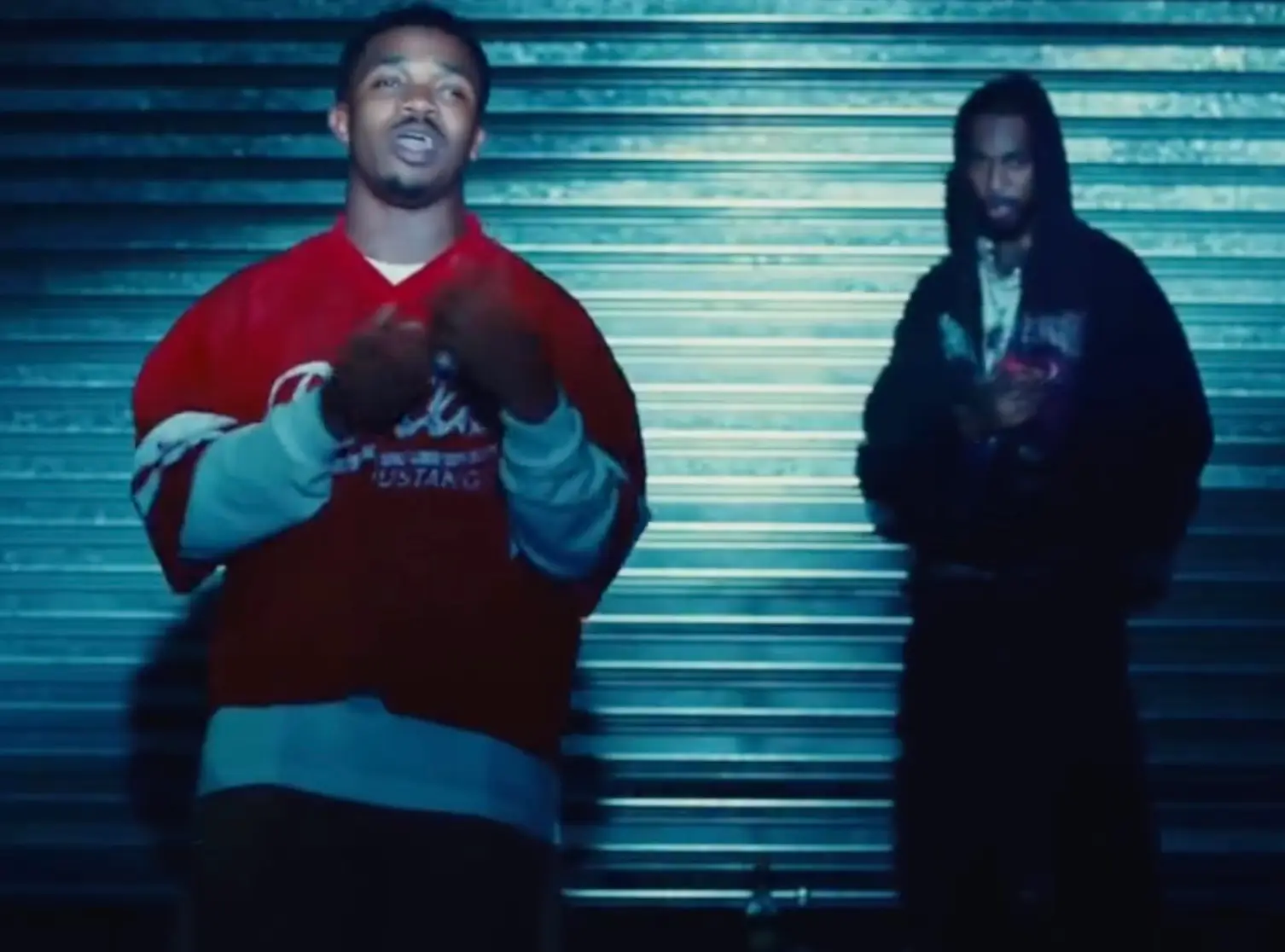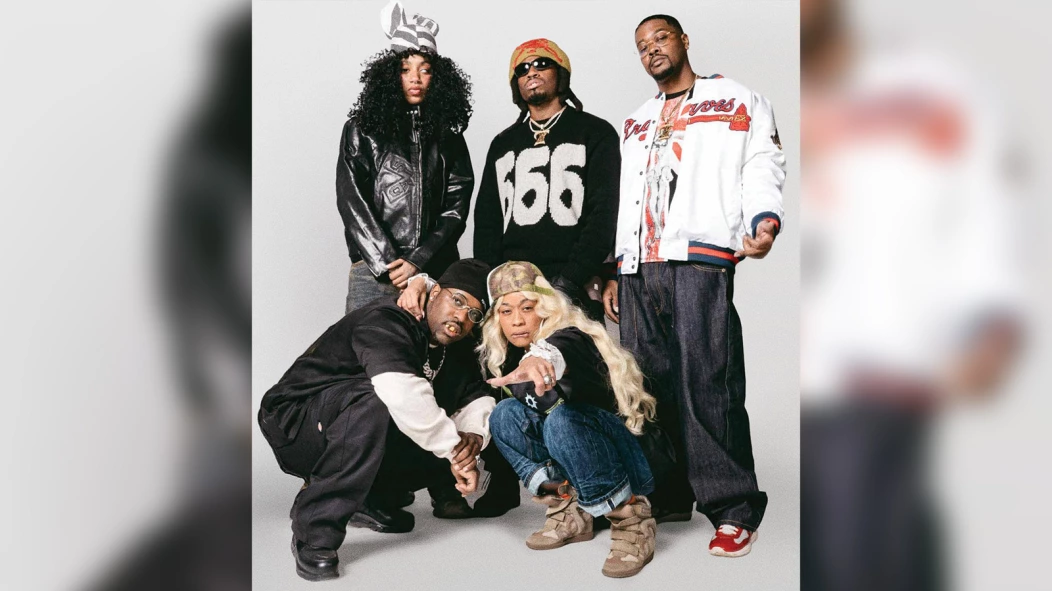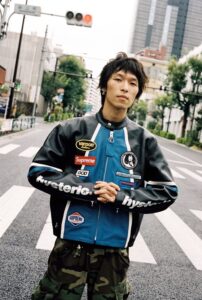The late afternoon heat outside Houston hits like a tidal wave, thick and unapologetic. The air ripples above the asphalt as That Mexican OT, born Virgil René Gazca, steps out of a corner store with a bottle of Topo Chico in one hand and a wrinkled bag of Takis in the other. His long curls bounce as he laughs at an inside joke with his crew. There’s an instant magnetism to him—equal parts neighborhood mischief and magnetic star power.
We climb into a black Escalade, its leather seats radiating warmth from the Texas sun. As soon as the doors close, the windows start to fog. The scent of burning kush and cologne collides in the cabin. OT puts on a beat that rattles the speakers, and suddenly, it feels like we’re orbiting a different world. This is where he feels most alive—inside a car, music blasting, words flowing like an endless river.
“I make music for the dumb ones,” he blurts out between puffs, correcting himself with a mischievous grin. “Well, I make music for people who want to feel good, who don’t want to overthink everything. I want them to just turn up and laugh and maybe dance a little.”
There’s a disarming honesty in his approach. For OT, music isn’t about chasing poetic perfection or standing atop some ivory tower of lyrical academia. It’s about connecting viscerally, unapologetically, and sometimes chaotically.
A Texas Tale, Unfiltered
That Mexican OT grew up in Bay City, Texas, a small town about an hour and a half southwest of Houston. The town, known for its cattle and shrimping industries, doesn’t immediately scream hip hop mecca. Yet, it was the perfect incubator for a kid who saw life as a series of movie scenes waiting to be soundtracked.
“My mom played a lot of old Tejano and country,” OT recalls. “But my uncle was the one who showed me SPM, Fat Pat, UGK. That stuff was like gospel to me. And then when I got older, I started listening to everything—Nipsey, Gucci Mane, some old rock too.”
There’s no mistaking OT’s accent, a thick drawl that drips with Texas soul. It’s an accent that tells you he’s not faking it, not trying to cosplay as a coast-to-coast chameleon. It’s rooted, unwavering, as solid as the ground he grew up on.
The early days were tough. He laughs recalling when he would sell CDs out of his backpack at high school football games. “I’d record at my homeboy’s house, like, literally next to the washing machine. You could hear the dryer going off in the background,” he says. “But it didn’t matter, man. I knew someone would hear me eventually.”
Breaking the Internet (and Then Some)
In 2023, That Mexican OT’s single “Johnny Dang,” featuring Paul Wall and Drodi, broke through in a way few Southern underground hits do. With a hook that was instantly infectious and a video that felt like an unfiltered backyard barbecue, OT had finally arrived on a national stage.
“It was like… everything just clicked at once,” he explains, exhaling smoke in a swirling cloud. “The grills, the Houston scene, the love for cars and slabs. It was me being me, but on a bigger platform.”
The song’s success catapulted him into conversations beyond Texas. Suddenly, blogs and major platforms wanted interviews. A kid once scrounging for studio time was now a guest on stage with established legends.
Still, fame doesn’t seem to faze OT. If anything, it amuses him. “I’m just happy I can take care of my people now,” he says. “I never cared about being ‘famous famous.’ I just want to make enough to buy land, get some horses, and keep rapping.”
The Art of Unfiltered Energy
There’s a paradox at the heart of That Mexican OT’s music. On the surface, it might sound like party anthems and chaotic energy. But beneath that, there’s a subtle commentary on escapism and self-acceptance.
“People think you gotta be deep all the time,” he says, shifting in his seat as he pulls another beat up on his phone. “But sometimes, the deepest thing you can do is let go. Like, if you’re always worried about saying something ‘correct’ or ‘smart,’ you miss the point. Life is about moments, and my music is about those moments.”
It’s a philosophy that resonates deeply in a time when many artists are over-engineered for virality. OT thrives on spontaneity. His creative process is as freeform as his interviews—half-thoughts, laughs, unfinished verses, random sound effects. Yet somehow, it all comes together into something authentic.
On Style, Image, and Legacy
Style is non-negotiable in OT’s universe. The trucker hats, the colorful hoodies, the diamond-studded grills—all meticulously chosen yet thrown together with a breezy confidence. “I always been fly, even when I had nothing,” he jokes. “Style is a language, and I speak it loud.”
When asked about legacy, OT pauses for the first time. The Escalade falls silent, aside from the low rumble of the engine. “I want to be remembered as someone who made people smile. Someone who made them feel like they could just exist and not apologize for it.”
It’s a simple mission, but powerful in its own right.
Texas Forever
At his core, That Mexican OT is deeply loyal to Texas. From his lyrics to his beats to his Instagram stories filled with barbecue plates and lowrider meetups, everything points back to home.
“Texas made me. You can’t copy that. You can’t fake it,” he says with a sharp laugh. “I’ll always represent for us, no matter where I go.”
This commitment to place gives his music a certain weight and warmth. It’s both an open invitation and a protective shield. You’re welcome to join the party, but you’ll never quite replicate it.
The Road Ahead
As we round the block for what feels like the fifth or sixth time, OT’s manager signals that it’s time to head to soundcheck. The rapper nods reluctantly, flicking ash out the window.
“I got a lot more coming,” he promises, cracking a fresh smile. “More singles, a new album, some big collabs I can’t even talk about yet.”
Yet despite the buzz and opportunities, he remains tethered to the core idea that first pushed him to rap over laundry machines—unfiltered joy.
“I want my music to be a soundtrack to whatever you’re doing,” he insists as he climbs out of the Escalade. “You could be at the gym, cooking carne asada, riding with your girl—whatever. Just don’t overthink it. Just feel it.”
Final Thoughts
As OT disappears into a sea of backstage hustle, one thing becomes clear: while the phrase “I make music for stupid motherfuckers” might sound abrasive at first glance, it actually reveals a deeper ethos. It’s not about disrespecting his audience. Quite the opposite. It’s about freeing them from the constraints of hyper-analysis and inviting them into a world of raw, uninhibited expression.
In a landscape oversaturated with polished personas and forced authenticity, That Mexican OT’s brazen approach feels refreshing—even necessary. He isn’t trying to be a philosopher, an activist, or a spiritual guide. He’s simply an artist who wants to make you laugh, dance, and maybe see your own life in a brighter light, if only for three minutes at a time.
In a world desperate for meaning, sometimes the greatest gift an artist can offer is to help us forget, even just for a song. And That Mexican OT does exactly that—one hook, one verse, one hotboxed Escalade at a time.
No comments yet.








